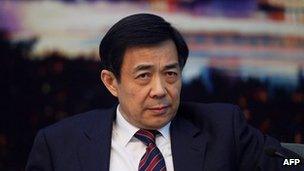China faces to watch: Bo Xilai
- Published
China is gearing up to change its top leaders, a process that begins at the end of the year. This week, the annual parliamentary session will give those in the running the chance to show off their credentials. The BBC's Michael Bristow profiles key figures.
Bo Xilai, 62, is the nearest thing China has to a Western-style politician.
Like Xi Jinping, he is the son of a famous communist hero, but he has gone on to forge his own unique public personality.
He ran the big coastal city of Dalian and then became commerce minister, before moving to his post in charge of Chongqing, a sprawling city in western China.
But a scandal during this posting proved to be his undoing and state media reported that he was removed from office on 15 March. He has been replaced by Vice-Premier Zhang Dejiang.
The scandal erupted when his former chief of police in Chongqing, Wang Lijun, spent a day at a United States consulate in Chengdu last month.
Bo Xilai launched two high-profile campaigns in Chongqing, including one to promote China's communist past.
The other sought to crack down on the city's organised crime, which previously seemed to operate with the protection of many government officials.

Mr Bo has been replaced by Vice-Premier Zhang Dejiang s Chongqing's Communist Party leader
Suave and sophisticated, Mr Bo sent his son to study at Harrow, one of the UK's most exclusive private schools.
The politician seems at home in front of the cameras and appears to enjoy pushing his policies in public.
During China's annual parliamentary session, the National People's Congress (NPC), Mr Bo spoke about his ex-police chief, answering questions from journalists at a meeting on its sidelines.
He said he had not imagined Mr Wang would run off. It came suddenly, Mr Bo said.
"I feel like I put my trust in the wrong person."
It is unclear what the future holds for him now.